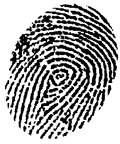| Digital Identity and Reputation | 2002-12-31 16:55 1 comment |
 by Flemming Funch by Flemming FunchThere is a discussion on digital identity happening among several prominent webloggers: Eric Norlin, Doc Searls, Mitch Ratcliffe, Britt Blaser and more. There seems to be general agreement that there needs to be a basic level of a person's public identity which the person himself will control. But aside from that, it is a bit fuzzy. Norlin outlines three tiers of identity, where the part the individual controls would be T1, but it doesn't sound like he's quite getting the other two right. I agree with Ratcliffe that the next level (T2) would be where one grants some kind of community the right to compile some kind of reputation information on you. Like in eBay where one can see how many trades people have done, and how happy the other parties were, or like in NCN where one can see how active other people are, and how well other people trust them. But one should be able to revoke the right to be tracked that way, in case one would rather be anonymous or start all over. And, of course, others would have the right to not deal with you because of that. Doc Searls calls T1 MyIdentity, T2 OurIdentity, and T2 TheirIdentity. The third tier (T3) would then be the composite guesswork made by marketers based on some demographics and public history. Ratcliffe and Searls relate Andre Durand's idea that "When T1 identities have real customer relationships with T2 partners, T3 goes away. We will have the final defeat of Marketing as Usual." Ah, yes. Correct and useful collaborative information will out-compete the sloppy one-sided centralized guesses. This whole discussion arises in part because there are big corporations who would much prefer if THEY own and control your identity altogether. So, this is a grassroots attempt of coming up with something better. Britt Blaser points out correctly that an individual never will own every aspect of their own ID, because it is our collective sense of a person that matters, not their own. People will interact with you based on their idea of who you are, and what you yourself tell them is only one part of it. Your history with them is more important. Overall, I think the task is to come up with something that as correctly as possible represents people's real reputation, which they obviously can't be allowed to construct on their own; and that has some built-in accountability, so that one can't easily run away from transactions without paying; and that can't be thwarted by the person himself entering false information; and that isn't either controlled by big heartless corporations who could care less if you're branded as a loser for the rest of your life. And fundamentally you need to be free to choose who you are in life, and how much of yourself you want to share with the world. It is a hard puzzle to solve well, but very important. |